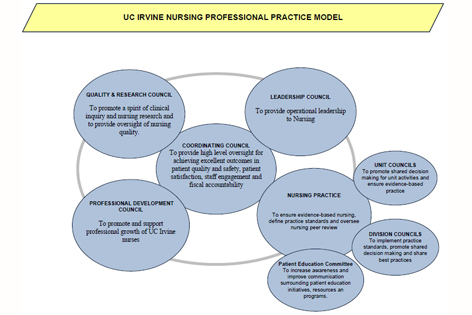
Shared Governance
A nursing shared governance model is integrated into the operation of UC Irvine Medical Center. Shared governance enables nurses from all settings and roles to participate in decision-making groups such as committees, councils and task forces in our organization.
 At UC Irvine Medical Center, there are seven
overarching councils that make up our nursing shared governance model:
At UC Irvine Medical Center, there are seven
overarching councils that make up our nursing shared governance model:
- The Coordinating Council provides oversight for achieving excellent outcomes in patient quality, safety and satisfaction, staff engagement and fiscal accountability. Its members include the chief nursing officer, staff nurses, a representative from the Nursing Sciences Program, inpatient leaders, ambulatory leaders, the Magnet Program director and chairs or designees from the other six councils.
- The Quality
and Research Council exists to promote a spirit of clinical inquiry,
evidence-based practice and nursing research. This council:
- Provides an infrastructure for developing and conducting nursing research and includes generating ideas and discussion for research, and identifying barriers, needs and issues
- Facilitates development, conduction, completion, dissemination and utilization of research
- Uses the National Database of Nursing Quality Indicators (NDNQI) and Collaborative Alliance for Nursing Outcomes (CalNOC) data to assist in the formulation of research opportunities
- Helps identify research funding opportunities to successfully connect research projects with nursing performance improvements
- The Professional Development Council promotes and
supports professional growth of the registered nurse. This council is
responsible for:
- Regular assessment of education needs
- Planning of the annual ongoing education calendar
- Supporting competency-based education and evidence-based practice
- The Leadership Council provides operational leadership to the nursing staff, provides advice and collaborates with the CNO on management issues. This council communicates and implements management goals and strives to create a common language for nursing management. Its members plan and lead the nurse manager meeting and promote professional growth for succession planning as well as leadership infrastructure. Its members include the CNO, an inpatient director, an ambulatory leader, an emergency department supervisor, a nurse manager from each division, a human resource officer and a house supervisor.
- The Nursing Practice Council promotes evidence-based practice, defines practice standards and policies, and oversees nursing peer review. Its members include all clinical nurse specialists, a chair or designee of Research and Leadership councils, an inpatient nursing director, an ambulatory leader, nurse managers from each division, Division Practice council members, an ambulatory staff representative and a nursing informatics representative.
- Division Councils implement practice standards and promote shared decision making. These councils communicate with other division councils and are a forum to ensure consistency for standards of practice and improvement activities. They also translate the Professional Practice Model into actual patient care. Membership includes representatives from each division unit, a nurse manager and a clinical nurse specialist or nurse educator.
- Unit Councils are unit-based
practice councils that promote shared decision making for unit activities and ensure
evidence-based practice. These councils:
- Provide communication between bedside staff and the professional practice councils
- Teach and promote shared decision making on the unit
- Lead pilot projects for care improvements
- Encourage and support professional growth and a healthy work environment